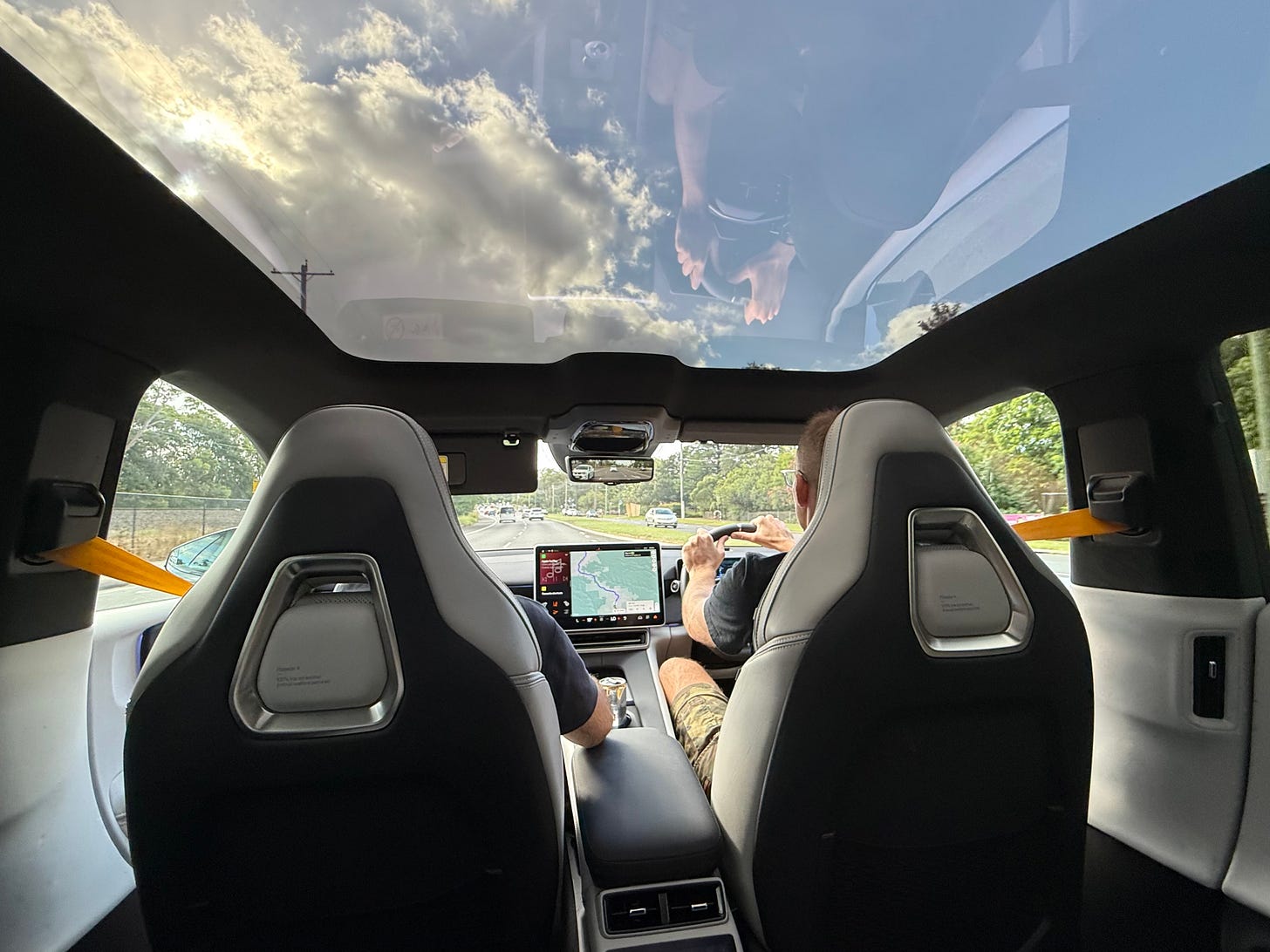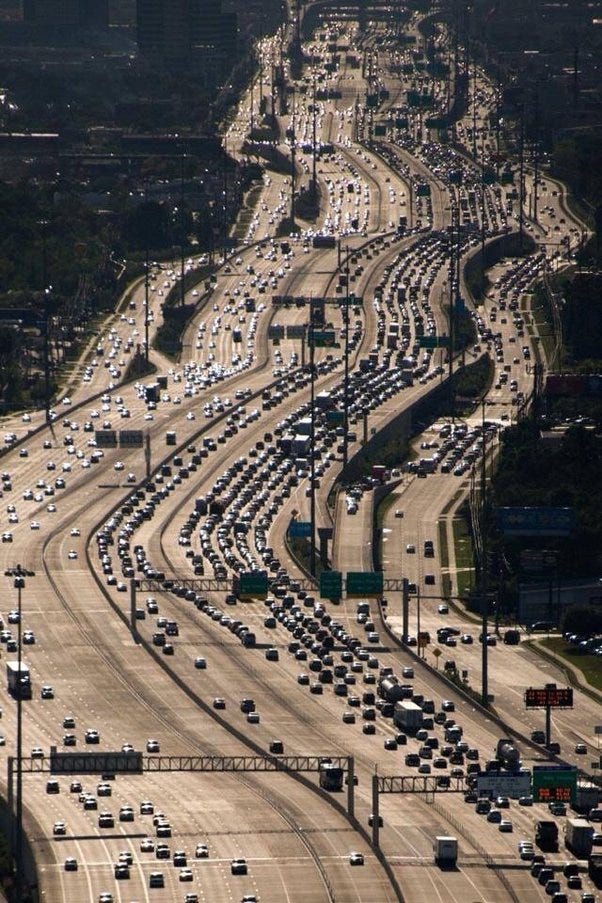It might surprise some long term followers of my ramblings, broadcasts, rants, writings and general schmutter that I have always been on the conflicted fringes of the car hating minority.
If you cast an eye over any cityscape on earth, you might notice tall buildings, you might notice tree lined streets, but what you will always see is big roads, massive elevated highways, huge car parks and streets crammed with oversized metal machines which, for 99% of the time they are in use only carry one person.
Forget whether they are petrol, diesel, hybrid, electric for a moment, they are all still cars and they dominate the environments we live in. For the past 100 plus years we have built our cities around cars, not people, and now we are paying the price.
Our forebears who built the cities we now live in are to blame, they couldn’t see past their own fantastical dreams of ‘the future’ and ‘the modern world’ and we’ve been lumbered with the results.
I wonder if future generations will look back at us burning trillions of tons of fossil fuels which will deeply and profoundly affect the world they have to live in. I know, that’s a stupid question, they will look back at the current epoch and curse us, and rightly so.
Of course the one advantage they will have is all the bigot brained billionaires will be dead on Mars, so there’s always an up side.
But, and here’s where I differ from my hardcore, car hating comrades. We are not going to get rid of this technology no matter what. Cars are here to stay, we cannot ‘uninvent’ them.
The main thing we can hope for is we start to properly share them, and that they get smaller, lighter, cleaner, quieter, more energy efficient and more recyclable at the end of a very, very long life.
If you think ‘self driving’ vehicles are going to solve anything, I can’t help you. I have ridden in numerous self driving cars and would be among the first to admit the technology is impressive, but I experienced these machines 10 or 15 years ago. Where are they today?
Some cities have allowed a handful to be on the streets, but literally all the reports I’ve heard do not indicate that the general car use in those cities has reduced. Much of the research around self driving cars indicate their adoption might make things worse, more congestion, more stress for people who’s job requires driving (deliveries etc).
I have come to the (possibly unpopular) conclusion that the huge technical effort and vast sums spaffed on self driving technology has already peaked and it will slowly and quietly shuffle off to a dusty yard just outside the city limits.
Self driving cars are a billionaire fantasy that hopes to create a technology that doesn’t require hiring annoying humans, because, you know what poor people are like, embarrassing and needy. Eeeuuuww.
But cars we drive, no matter what opinions we hold, are here to stay. I recently had a ride in the back of a Polestar 4, an electric car designed in Sweden and built in China, which was so unutterably wonderful I could not help but sit in abject comfort and admire the human ingenuity and manufacturing skill that made such a machine possible.

I took this picture from the back seat, the sun roof is huge, as a passenger you really appreciate the luxurious space, the incredible suspension which seems to absorb all but the biggest lumps and bumps. The seats are so ridiculously comfortable, they tip back so you feel super secure, and can nod off with ease.
I couldn’t hate it, I couldn’t dismiss it as mere frippery, a rich person’s status toy. It’s incredible that we’ve reached a point where manufacturing something of this quality, in large numbers, and then ship them around the globe is possible.
And of course I have to mention that it is fuel agnostic. Unlike a fuel burning car, an electric car can use electricity from any source, coal, oil, gas, nuclear, wind, hydro, solar. It does not care where the electrons come from who who generates them, giving a machine this unimaginable flexibility.
Sadly a fuel burning car can only burn one type of fuel, and the handful of big suppliers of that fuel have a stranglehold, sorry, I mean sensible influence over our governments and society.
Of course if the 3 of us in the car had been on an electric bus it would have been a much better option, if we’d all ridden electric pedal assist bikes, yes, better still. If we’d all just walked it would have been delightful, but we’d have spent the entire day walking and we did the journey in the car in 45 minutes.
Now, I don’t want this update to be a commercial for the Polestar 4, much as I admire the company. There are now literally dozens of amazing electric cars available, many of them . . okay, most of them built in China.
I was merely inspired to think about our relationship with cars when I was seated in the back. I had a go driving the car later that day and it’s a pure joy to operate, but again, that’s not the point.
The simple fact is, when local authorities start to put restrictions on private car use in big cities, there is initial resistance from people who have regularly driven vehicles in these crowded areas. It is claimed by some to be a ‘gross infringement of their fundamental freedoms’ which of course totally negates the fundamental freedoms to walk safely and breath clean air of the vast majority of city dwellers.
However, after a while people start to see the benefits. Instead of always getting in the car to complete every task that requires transport, people start to consider other, cheaper, cleaner and in many cases faster options. Walking, cycling on safe cycle paths, using good, clean, cheap public transport. (If you are going to restrict urban car use, those last two are vital.)
In saying this, I am thinking more of older European and Asian cities where better public transport and micro mobility, that’s bikes, scooters, mopeds etc has really taken hold. Older cities with narrower streets and denser housing really don’t work well with dominant car use.
I accept this is a much harder ask for cities in the new world, the USA, Canada, Australia etc, where essentially cities were built around the car.
But even in a possible transport utopia where there are no private cars in cities, and everyone is happily walking, cycling and using public transport, there will still be cars, because cars are really useful at times.
This is where my contradictions become awkward. Cars are brilliant.
Cars, huh, what are they good for . . absolutely rather a lot.
They are, like air travel, an incredible invention of which we should both be grateful and proud. Our great, great grandparents could not possibly imagine the enormous benefits huge numbers of people have had when accessing cars and passenger planes.
As always, it’s about balance and appropriate use, I am just about optimistic enough to think we can adapt to a reduced car use diet, but in saying that, I am about to drive my sister in Law’s BYD Atto 3 electric car to pick up my wife and drive across a modern city to visit friends.
Contradiction eh, they are the stuff of life. I will end with this oft used quote, but it’s a good ‘un.
“A developed country is not a place where the poor have cars. It's where the rich use public transportation.”
―Gustavo Petro (President of Columbia)





We were talking and I said "Beeching", my son said "but a lot of the stations were tiny and not many people used them"
I counted, if the station's had been kept, as a country we'd be driving cars less.
Perhaps Beeching needs to do his hatchet 🪓 job on modern car use.
I recognise this contradiction too.
If you live in a big city like London it's madness to run a car. You are much better off occasionally hiring one for specific journeys.
But in rural areas public transport is just tricky to manage. To make it good enough with frequent well interconnected services you would have to spend a fortune.
I disagree on one aspect of self driving. I think it could be revolutionary for the elderly and/or disabled.